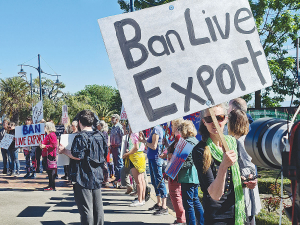ACC backs young farmers with FMG Young Farmer of the Year partnership
The Government has announced that ACC will be a sponsor of this year's FMG Young Farmer of the Year competition.
 A series of nationwide rallies have been organised in protest of the potential repeal of the live export ban.
A series of nationwide rallies have been organised in protest of the potential repeal of the live export ban.
As the new government considers lifting the ban on live exports, protestors are set to demonstrate against the policy.
Rachel Poulain, spokesperson for End Live Export NZ, says the ban – which was introduced by the last government in 2021 and took effect last year – was a “landmark achievement” for animal welfare in New Zealand.
“Its reversal would expose hundreds of thousands of animals to horrific suffering during long journeys at sea,” Poulain says.
The decision to ban live exports came about in the aftermath of the sinking of the Gulf Livestock 2 in 2020 and when intentions to begin banning the practice were revealed, then-Agriculture Minister Damien O’Connor said the National Animal Welfare Advisory Committee (NAWAC) had recommended the trade, valued at approximately $500 million, stop.
However, the ban proved controversial, and O’Connor was accused of ignoring official advice from the Ministry for Primary Industries which stated that banning live exports would cause an economic loss and make the recovery from the Covid pandemic more difficult in rural communities where livestock exports provided an additional source of income.
National’s then-animal welfare spokesperson Nicola Grigg (now the current government’s Associate Minister of Agriculture) claimed the ban made a mockery of the select committee process by ignoring submitters who opposed the ban.
“Clearly it was a predetermined outcome and there was no intention to listen to any evidence, any science, any experience from international jurisdictions – making it a total waste of time to all those people who put hours and hours into submissions,” she told Rural News at the time.
Meanwhile, the organization that represents live exports, Live Animal Export New Zealand, claimed the move to ban live exports was out of step with the New Zealand public.
“According to an independent research report by science insights company Voconiq, over half of New Zealanders surveyed confidence that regulation can hold the industry accountable,” Live Animal Export New Zealand spokesman Mark Willis said back in 2022.
He said the industry had called for higher standards of care for animals exported from New Zealand, with a “clear and evidence-based 12-point regulatory plan” provided to O’Connor but no response was received.
However, another spokesperson for End Live Export NZ, Elin Arbez, says the majority of Kiwis supported the initial ban on live export by sea.
“A recent SPCA survey revealed that only 19% believe the ban should be lifted,” Arbez says. “The general public expects animals in this country to be treated with a high standard of welfare, and live sea exports appear to directly contradict this expectation.”
Monthly rallies are set to be held across the country to protest the reversal of the ban, with the first scheduled for this Sunday 25 February.
Rallies will be held in Auckland, Wellington, Christchurch, Napier, Hamilton, New Plymouth, Timaru, and Nelson.
Jane Mellsopp has been confirmed as the new Government Appointee to the New Zealand Meat Board (NZMB).
To celebrate the tenth anniversary of its annual Good Deeds competition, Rabobank will give away $100,000 to improve rural community hubs, schools, clubrooms, and marae across New Zealand.
Agricultural and veterinary product supplier Shoof International has appointed Michaela Dumper as its new chief executive.
Federated Farmers is celebrating following the Government's announcement that young farmers will be able to use their KiwiSaver funds to buy their first home or farm.
The Meat Industry Association of New Zealand (MIA) today announced that Chief Executive Officer Sirma Karapeeva has resigned from the role.
The winners of the 2026 Hawke’s Bay/Wairarapa Dairy Industry Awards were announced at the annual awards dinner held at Copthorne Solway Park in Masterton on Thursday evening.

OPINION: A mate of yours truly reckons rural Manawatu families are the latest to suffer under what he calls the…
OPINION: If old Winston Peters thinks building trade relations with new nations, such as India, isn't a necessary investment in…